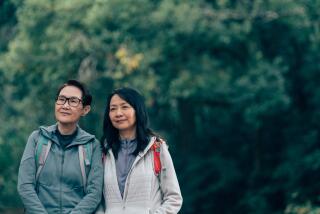Two cultures clash in one haphazard family’s melting pot
- Share via
Welcome to the “soup du jour” family of the Wongs. There’s Carnegie, an Asian American who has spent his life rebelling against his controlling, capitalism-embracing mother. Mama Wong came to the U.S. for a new life after escaping from mainland China by making her way across the harbor to Hong Kong, a basketball under each arm, kicking the whole time. She’s since become wealthy with real estate investments, convinced that anyone can pull herself up by her bootstraps in this land of opportunity, yet carries live bait in her purse in case the chance to fish should present itself.
As an untethered young man, Carnegie adopts an abandoned Asian infant on impulse. Just as he makes this decision, he meets Janie, a WASP-ish, curvy woman who decides she and Carnegie are destined for each other. Blondie (as Janie is dubbed by Mama Wong) speaks better Chinese than Carnegie; clearly, she believes, their marriage is fated. They name the child Lizzy, and eventually expand the family with Wendy, adopted from China, and Bailey, the couple’s conceived-late-in-life “bio” baby.
Using this delightfully haphazard family as her template, author Gish Jen takes on the multi-culti aspects of contemporary life in “The Love Wife.” As in her earlier works, “Mona and the Promised Land” and “Who’s Irish?,” she employs humor and fabulous writing to explore the changing mien of the present-day American family.
The jumbled Wong clan seems to be doing just fine until a new face is added to the mix. Mama Wong dies and leaves a will naming a Chinese relative who’s to come and stay with the Wongs as a nanny for at least two years. When Lan arrives, fresh from the provinces, she upsets the household’s uncertain balance and seems to do Mama Wong’s bidding from the grave.
Mama Wong, we learn, had always disapproved of Blondie as a wife for her only son. On the eve of their wedding, in fact, she’d stealthily offered first Carnegie and then Blondie a million dollars to call off the nuptials. Has she plotted her revenge, using Lan as a wedge to break apart what she’d so resented?
The story becomes one of culture clash, as Lan relishes her foreignness and asceticism and acts smugly superior to the Americans with their lives of ease and luxury. She’s not exactly anxious to assimilate but she’s hungry to make a good life for herself nonetheless. Blondie notices Carnegie’s attraction to Lan and can’t help but wonder why she’s been sent. The girls, meanwhile -- edgy 15-year-old Lizzy and shy 9-year-old Wendy -- connect with Lan and delight in learning about their Asian roots. They’re convinced Lan understands them better than their mother does. The more Blondie tries to embrace the increasingly Asian quality of her family, the more she is excluded and shunned. “Was there such a thing,” she begins to wonder, “as being too open?”
The story is narrated in an odd way, with each of the characters addressing the reader directly, offering bits of his or her own story, and sometimes answering the other characters on the page. It’s as if the group of them is on a stage, telling us in extended monologues what has happened.
Jen’s humor and sharp writing are delightful, as when Carnegie describes meeting baby Wendy for the first time. “She had a black buzz cut; a fat face; bright slit eyes; four teeth; and many chins, past which we hypothesized a neck.” Or, when he describes entering a country-decor house, filled with “items meant to inspire us ... to pause mid-rat race and pay homage to the stencil.” Likewise, Jen’s parody of the New Age mind-set Blondie embraces is right-on.
Though at times the plot is a three-ring circus, with antics happening all around, the story is not slapstick. Ultimately, the book becomes a tale about family love and commitment in an era of political correctness and our society’s at-times awkward embrace of multiculturalism. At heart, the novel demonstrates with vividness and wit how a decision to love can be equally, if not more, lasting as the biological impetus to love.
More to Read
Sign up for our Book Club newsletter
Get the latest news, events and more from the Los Angeles Times Book Club, and help us get L.A. reading and talking.
You may occasionally receive promotional content from the Los Angeles Times.







